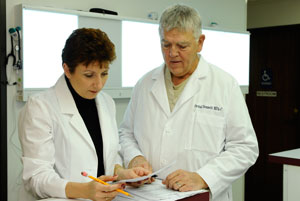I nfertility nfertility
Select from the following topics to learn more about Infertility.
What's New: Lifestyle and Dietary Recommendations for the Infertile Male
Patients with infertility can have some control of their reproductive function by living healthy lifestyles. Often some negative lifestyles may be contributing to their infertility. Therefore, if patients live healthy lifestyles, it is possible that there will be some improvement in their reproductive function. There may not be conclusive evidence for all these lifestyle recommendations, but rarely will following these guidelines hurt, and often they may help.
Click here to read more.
How to Enhance Your Fertility (and help to ensure a healthier baby, too)
Sperm from a man's body unites with a woman's egg to create a totally unique and genetically irreplaceable human life. It's an amazing process. Yet most men know very little about what contributes to reproductive health -- or conversely, what undermines it. We seldom think about our fertility or the health of our sperm...except perhaps during sexual activity. Yet science tells us we should consider our fertility and be protective of it. Indeed, there are things we can do to safeguard our reproductive health...and the well- being of our future children. It all starts with being more knowledgeable about our health in general, and about behavioral choices and environmental hazards that can adversely affect our reproductive well-being.
Click here to read more. 
Evaluation And Treatment Of Male Infertility
Infertility is currently a problem for one out of five couples presently trying to have children. If after a year of trying to conceive a couple is not successful, a basic infertility evaluation may be started. However, if the female partner in the couple is over thirty or has a significant past medical history of irregular periods or previous pelvic infections, the infertility evaluation and tests can be started earlier.
Click here to read more.
Immunological Factor and Infertility
The immune system provides us with a multilayer defense against invading microbes and foreign intruders. It can recognize the difference between normal (self) and alien (non-self) cells, trigger a local or widespread inflammatory response, and retain the memory of the offending organism to repel it again if it should ever return. Like any finely-tuned machine, however, the system can break down and leave us open to the threat of infection, or, conversely, turn against our own healthy tissues, as occurs in such diseases as rheumatoid arthritis or lupus.
Click here to read more.
[Top]
Varicocele and Infertility
Varicocele may turn out to be the most common cause of male infertility. Fortunately, at this time, it is also the most treatable. Between 30 and 40 percent of all infertile men have a varicocele - a varicose vein of the testicle - as their only symptom. Also, 15% of the male population has varicocele that cause no symptoms and don't appear to cause infertility.
Click here to read more. Reprinted with permission from Dialogue Medical, dialogmedical.com.
Quick navigation links:
What is a Urology Center | Urologist | Urology Conditions | Urology Services | Resources for Health | Contact Urology Center in North Texas | Sitemap | Home
Disclaimer:
The pictures displayed in www.TexasUrology.com are images of actual patients and employees who have consented to have their picture in this website.

Website Design & Educational Content © Copyright 2023 MedIngenuity, LLC
Medingenuity develops content-rich educational web sites for urologists and urology group practices.
|